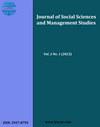通过电影提高语用能力的意识及利用电影教授会话含义的效果
引用次数: 0
摘要
语言技术的快速发展为第二语言的教学和学习创造了巨大的机会。使用电影作为辅助手段是最好的教学方法,既能支持学生,又能使他们以有目的的方式愉快地学习。电影是一种不常用的多媒体技术。有鉴于此,本研究的重点是理解个体话语背后的意义、语言中言语的复杂性以及通过电影教学和学习会话含义的知识的价值。本研究通过问卷调查的方式调查了沙特阿拉伯的英语学习者对英语含义的感知,沙特阿拉伯和东亚国家一样,英语是作为一门外语学习的。共有441名受访者。此外,本文还列举了保罗·格赖斯(Paul Grice) 1975年提出的《合作原则》(Cooperative Principle)及其在《平面电影》中的含意。在现实生活中,当被问及一个他们不愿回答的私人问题时,66.5%的受访者选择藐视相关性格言,而32.4%的受访者选择藐视质量格言。当被问及语言学习是通过课堂学习还是通过电影学习,还是两者兼而有之时,他们的回答都是赞成的。22.1%的受访者表示只能通过学习来学习,23.2%的受访者表示只能从电影中学习,相比之下,54.7%的受访者表示两种情况下他们都可以学习。该研究建议,为了教授语用概念,如会话含义,英语课程还应该包含像电影这样的视觉辅助工具,语言教师应该在布置家庭作业或作业时使用它们。本研究的发现可能对EFL/ESL学生、教师和课程设计者有利。本文章由计算机程序翻译,如有差异,请以英文原文为准。
Awareness of Enhancing Pragmatic Competence Via Movies and Effectiveness of Teaching Conversational Implicature Using Films
Rapid advancements in language technologies have created enormous opportunities for teaching and learning a second language. Using films as an aid is the best teaching method available to support students and also to enable them to study in a purposeful manner with fun and entertainment. Films are one of the infrequently used multimedia technologies. In this light this study focuses on the value of understanding the meaning behind the individual’s utterances, the complexity of speech in a language, and the knowledge of teaching and learning conversational implicature through movies. This research investigates the perception of implicature via a questionnaire to EFL learners in Saudi Arabia, where, as in East Asian countries, English is acquired as a foreign language. There were 441 respondents. Also this descriptive qualitative study lists the floutings of Paul Grice’s Cooperative Principle (1975) and the implicature in Plane Movie. In real life in queer situations if asked a personal question, to which they are reluctant to reply, 66.5% of the respondents chose to opt for flouting Maxim of Relevance, whereas 32.4% opted for flouting to the quality maxim Their responses to the question of whether language learning can be done through regular classroom studies ormovies, or both, came out in favor of both. In contrast to the 22.1% who said they could only acquire the language through studies and the 23.2% who said they could only learn it from movies, 54.7% of respondents said they could learn the language in both situations. The study suggests that in order to teach pragmatic concepts like conversational implicature, English curriculum should also contain visual aids like movies, and language teachers should use them while assigning homework or assignments. This study’s findings has significant repercussions that might be advantageous to EFL/ESL students, teachers, and curriculum designers.
求助全文
通过发布文献求助,成功后即可免费获取论文全文。
去求助
来源期刊

Journal of Social Sciences and Management Studies
Social Sciences and Management Studies-
自引率
0.00%
发文量
0
期刊介绍:
Journal of Social Sciences and Management Studies (ISSN: 2957-8795) is a peer reviewed journal focuses on integrating theory, research and practice in the area of management and social sciences. The journal discusses the distinctive disciplinary practices within the sciences of the management and social field and examines examples of these practices. In order to define and exemplify disciplinarity, the journal fosters dialogue ranging from the broad and speculative to the microcosmic and empirical. In considering the varied interdisciplinary, trans-disciplinary or multidisciplinary work across and between the social, natural and applied sciences, the journal showcases interdisciplinary practices in action. The focus of papers ranges from the finely grained and empirical, to wide-ranging multi-disciplinary and transdisciplinary practices, to perspectives on knowledge and method.
 求助内容:
求助内容: 应助结果提醒方式:
应助结果提醒方式:


